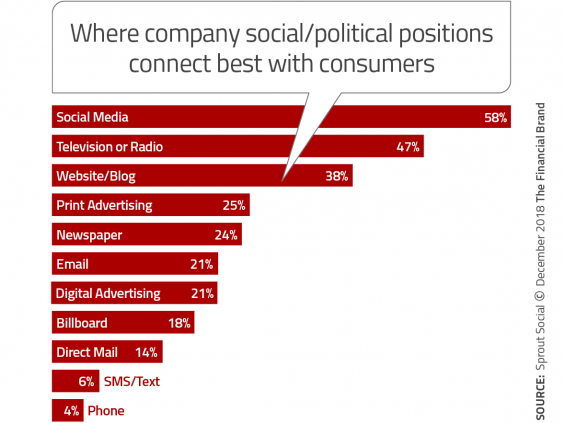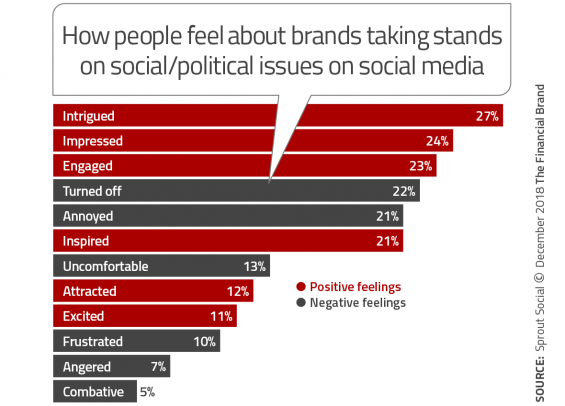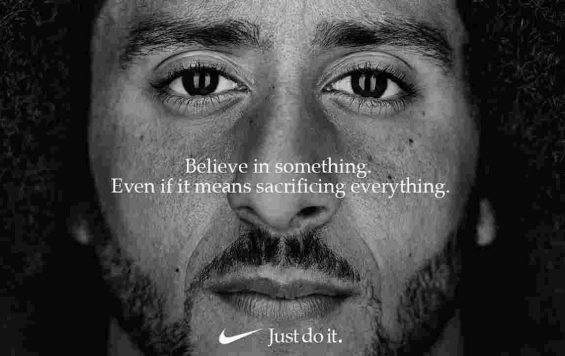Consumers today are more sensitive than ever about where brands stand on issues, and those feelings have a massive impact on whether they like and trust a company. Or not.
Emily Groch, Director of Insights at Mintel Comperemedia, says many industries — including banking — have both scored and lost trust points with the public over the last year or so by hitching their brands to certain memes and causes trending in social media.
Groch cautions banks and credit unions that the public’s trust isn’t something they can be passive about. Planning is critical, particularly whenever a brand activates any kind of corporate social responsibility campaign or otherwise engages in socio-cultural issues.
Increasingly, just being good at the “banking” aspect of the business isn’t enough for financial institutions, according to Groch. An astonishing 97% of consumers in a survey fielded by Sprout Social say that a company’s moral/ethics play either an important role in how they feel about the brand, and two thirds of respondents said it was “very important.” This aligns with Millennials’ reputation for embracing companies that support causes or viewpoints they support.

Why Industry Cloud for Banking?
PwC’s Industry Cloud for Banking helps deliver personalized products and services that today’s customers expect.

Navigating the Role of AI in Financial Institutions
83% of FI leaders agree investing in AI is essential for 2024 but how you leverage AI is instrumental in success and meeting customer expectations.
Read More about Navigating the Role of AI in Financial Institutions


Sprout Social’s research found that nearly half of consumers surveyed (47%) feel brands are most credible when they commenting on issues that directly impact their customers.
“Values-based marketing needs to operate at the intersection where the values of the brand and consumers intersect,” Groch advised. The match may not always be complete, and it may not be broadly popular, but it needs to be real, and to synch with a brand’s consumer base at the least. The public also considers it at least somewhat important that a brand acts morally and ethically.
“Nothing undoes long-term marketing investments like perceived hypocrisy.”
That means financial marketers shouldn’t hitch their brands to social causes unless there is a clear and relevant connection. If the audience is confused about the connection, they might accuse the organization of trying to hijack a cause purely out of greed. Or worse, they might mount a counterattack against a company they deem as a disingenuous fraud.
Why Nike Did That Kaepernick Thing
With NFL players kneeling in protest during the national anthem, many consumers didn’t understand why Nike would embrace Colin Kaepernick as a spokesperson. Kaepernick became the figurative poster boy for racial injustice in America when he began sitting and kneeling during “The Star-Spangled Banner” before his games as a San Francisco 49ers quarterback. Then Kaepernick became the literal poster boy when he became the official face of Nike’s 30th Anniversary “Dream Crazy” ad series, part of the 30th anniversary of the footwear firm’s famous “Just Do It” campaign.
Kaepernick narrated a TV commercial featuring athletes who have endured unfavorable odds to achieve a goal, and the campaign was circulated widely in social media channels. The message, “Believe in something. Even if it means sacrificing everything,” with the Nike #JustDoIt hashtag.
Most brand managers cringe at even the faintest waft of controversy. But Groch says Nike didn’t build a brand worth upwards of $30 billion with a safe marketing strategy and trite, homogenized messages that please everyone and offend no one. Nike frequently takes a stand on socially sensitive and politically-charged issues, as they did when they aligned their brand with Kaepernick.
The campaign drew fire and derision in social channels, but Groch says that doesn’t bother a smart, marketing-savvy company like Nike. Groch says Nike wanted to connect with an audience of young socially conscious males. The campaign paid off — big time. Not only did the target audience support the company’s position, generating over 1 million online engagements, it pushed Nike sales up by a staggering 31%.

Going Against the Brand Values You Promote
Nothing undoes long-term marketing investments like perceived hypocrisy. Groch has reviewed several case studies of companies outed for behavior that didn’t match the values they touted. Wells Fargo, slammed by the initial cross-selling scandal of several years ago, instituted major marketing pushes to communicate the adjustments it was making, only to suffer ongoing revelations with ripple effects to its reputation among consumers and regulators.
It doesn’t do any good telling people you respect them while you’re either screwing them or getting fined for doing so in the past. The timing and tone of your apology determines how successful your atonement will go over (more on that in a minute).
Inadvertently enforcing policies or contracts that go against espoused values is a trap many companies face. Think about the number of financial institutions out there (hint: nearly all of them) claiming how much they “care about their customers” while espousing values like “trust” and “personal service” in their mission statements. But when a bank’s behavior doesn’t align with its brand, customers will wag their fingers while zealously shoving the bank’s ads and corporate slogans back in the faces of “fat cat bankers” — almost always in social media channels.
Reality Check: People aren’t stupid. They aren’t easily fooled. They can smell lip service a mile away. And now they have powerful pulpits from which they can call out and shame violators: Facebook, Twitter, Instagram and Snapchat.
In the social media age, you can’t make brand promises lightly. You have to walk the talk. You have to take your brand messaging very seriously, all the time.

Industry Cloud for Banking from PwC
PwC’s Industry Cloud for Banking applies our deep industry knowledge to your specific business needs

How Banks Are Fortifying Their Data Against Increasing Cyber Threats
This webinar from Veeam will detail the value of working together across your organization to be better prepared in cyber defense and response readiness.
Read More about How Banks Are Fortifying Their Data Against Increasing Cyber Threats
Apologies That Cut It… and Those That Don’t
When you run into trouble — and every brand at some point has a “mea culpa” moment — it’s important to know how to recover. How badly the brand suffers hinges not only on the nature of the error, but how well it handles the aftermath.
Speaking personally, Groch, a Southwest Airlines frequent flier, recalled when she missed out on priority boarding because an employee forgot to check her status in the airline’s loyalty program. She shrugged it off and decided not to make a big fuss, but Southwest quickly followed up with an email awarding her extra miles to make up for the gaffe. A brand blunder turned into positive perceptions.
Groch said an Ohio State University study identified six key steps brands can take to execute a successful public apology:
- Express regret.
- Explain what went wrong.
- Acknowledge responsibility.
- Make a “declaration of repentance.”
- Deliver an “offer of repair.”
- Request forgiveness.
The brand that glosses over an error or fails to make sufficient apology risks eroding its business. Groch cited a Mintel report indicating that six out of ten consumers will actively avoid a brand that they think behaved unethically.
3 Keys to Boosting Consumer Trust
The flip side of avoiding problems is to take a proactive stance to build bridges and improve your institution’s image with the public. Groch outlines three following three steps.
1. Simplify everything. “Flo,” the Progressive Insurance spokes-icon, is navigating a jungle in her clean white overalls. Her companion, a confused consumer in sweaty safari gear, pushes aside a tree branch and warns Flo that there are people up ahead “who speak a language I can’t understand.” The pair come upon a clearing where a group of insurance agency employees at their desks begin jabbering in a strange tongue … insurance talk! Flo, with deadpan face, quickly translates the jabber. It’s corny as hell, but efforts like this video help show a brand’s commitment to making things or keeping things simple for consumers. Simplicity is second cousin to transparency and breeds trust.
Read More: Study Finds Consumers Have No Clue What Financial Marketers Are Talking About
2. Empower consumers with greater flexibility. We live in an era where heightened personalization is the new standard. Inasmuch, Groch says smart brands cede some control over how their product or service to consumers. While the insurance business is rife with jargon and take-it-or-leave-it policies, fintech disruptor Lemonade offers consumers multiple appeals. First, it simplifies the insurance buying process. Second, it allows consumers to engage digitally but with the ability to make amendments to policies that better fit their circumstances.
Another example of this that Groch cited in the financial industry is Wells Fargo’s Control Tower service, which enables consumers to adjust numerous account settings in one central location.
You want to make people feel like they have a voice — that they can participate, that their support for the brand is appreciated because their opinions matter and their views aren’t dismissed.
3. Personalize to show that you care. Here Groch calls on marketers to go beyond the basics like sending someone a birthday greeting. “What are you giving them besides ‘best wishes’?” asks Groch incredulously. “Give them something more real and meaningful.” For instance, Groch talks about how Capital One recently began letting customer service agents send personalized followup gifts to customers after conversations. One such present was a set of gardening tools after the customer and the CSR wound up talking about gardening. “People get kind of excited and take pictures and put them on social media,” said Groch.








